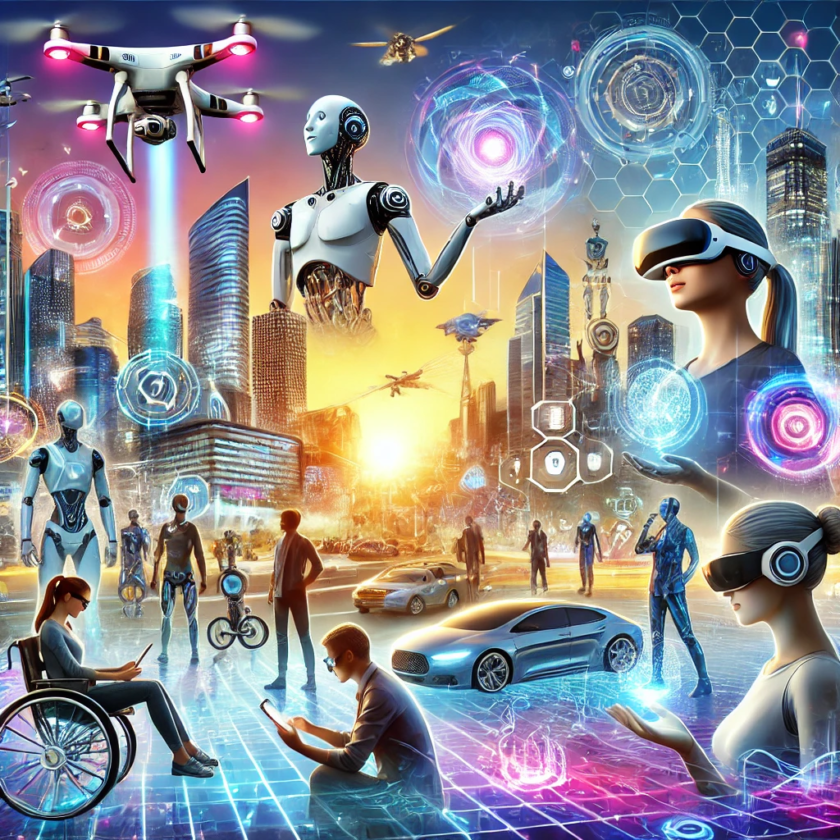A New Era of Computational Power
Quantum computing, a field once relegated to the world of theoretical physics and research labs, is rapidly becoming one of the most transformative technologies of the 21st century. With the potential to revolutionize industries ranging from cryptography to materials science, quantum computers promise to solve complex problems that are beyond the reach of traditional computers. But what exactly is a quantum computer, and how does it differ from classical computing? Here’s an in-depth look at the technology, its unique capabilities, and the future it promises.
Understanding Quantum Computing: The Basics
At the heart of quantum computing are principles from quantum mechanics, the branch of physics that describes the behavior of particles on the atomic and subatomic levels. Quantum computers harness these principles to process information in ways that classical computers cannot.
- Qubits: The Building Blocks of Quantum Computers
- Classical computers use bits as the smallest unit of information, represented as 0 or 1. Quantum computers, on the other hand, use quantum bits, or qubits. Qubits can exist in a state of 0, 1, or both simultaneously due to a property called superposition.
- Superposition enables quantum computers to process vast amounts of information at once, as opposed to classical computers that handle data sequentially. This parallel processing capability is one of the reasons quantum computers are anticipated to outperform traditional computers in certain tasks.
- Entanglement: The Quantum Link
- Entanglement is another key quantum phenomenon that quantum computers use. When qubits become entangled, the state of one qubit is directly linked to the state of another, no matter how far apart they are.
- This allows quantum computers to maintain relationships between qubits, enabling them to perform calculations much faster than classical computers. Entangled qubits work together, enabling computations that are exponentially faster than conventional ones.
- Quantum Interference
- Quantum interference is used to control the probability of a quantum state. Quantum algorithms apply interference to amplify correct paths and cancel out incorrect ones, enhancing computational accuracy.
How Quantum Computers Differ from Classical Computers
Quantum and classical computers are fundamentally different in the way they process information:
- Speed and Efficiency: Quantum computers have the potential to perform complex calculations in seconds that would take classical computers thousands of years. For instance, factoring large numbers, which is a basis for many encryption systems, can be done exponentially faster with quantum algorithms like Shor’s algorithm.
- Type of Problems Solved: Quantum computers are uniquely suited for optimization problems, simulations of quantum mechanics, and large-scale data analysis. For example, they can simulate molecular structures, helping to discover new materials and drugs more efficiently.
Quantum Computing in Practice: Applications and Use Cases
Quantum computing, while still in its early stages, has shown promise in several key industries:
- Cryptography
- Traditional encryption methods, such as RSA, rely on the difficulty of factoring large numbers, a task that would take classical computers an impractical amount of time to complete. However, with algorithms like Shor’s, quantum computers could theoretically crack these encryptions in a fraction of the time, posing both a challenge and an opportunity.
- To prepare, researchers are working on post-quantum cryptography methods that will be secure even in a world with fully functional quantum computers.
- Drug Discovery and Materials Science
- Quantum computers can simulate molecular and atomic interactions accurately, something that classical computers struggle to do. This capability could accelerate drug discovery by enabling scientists to model interactions at the molecular level, potentially leading to breakthroughs in medicine.
- In materials science, quantum computing allows for the design of new materials with specific properties, such as high-temperature superconductors or advanced battery materials.
- Optimization and Logistics
- Quantum computing excels at solving optimization problems, which involve finding the most efficient solution from a large set of possible options. This is useful for industries like logistics, where quantum algorithms can help in route optimization, supply chain management, and resource allocation.
- Companies like Volkswagen and D-Wave have already begun experimenting with quantum algorithms for traffic flow optimization, which could ultimately reduce congestion in major cities.
- Artificial Intelligence and Machine Learning
- Quantum computers could significantly improve machine learning algorithms by handling large datasets and complex models more efficiently than classical systems. Quantum-enhanced AI may enable faster data training, better pattern recognition, and improved natural language processing.
Challenges Facing Quantum Computing
While quantum computing has enormous potential, significant technical and theoretical challenges remain:
- Decoherence and Error Rates
- Qubits are highly sensitive to environmental changes, a phenomenon known as decoherence. This sensitivity makes them prone to errors, which poses a major obstacle for reliable quantum computation. Even small disturbances, like thermal fluctuations or electromagnetic noise, can disrupt a qubit’s state.
- Error correction in quantum computing is a field of ongoing research, with the goal of building fault-tolerant quantum systems.
- Scalability
- Building a large-scale quantum computer requires stable and interconnected qubits. Currently, maintaining and scaling up the number of qubits is a challenge, with even the most advanced quantum computers reaching only a few hundred qubits. Building quantum systems that can support thousands or millions of qubits is a long-term goal.
- Cost and Accessibility
- Quantum computers are expensive to develop and maintain. They require specialized environments, including ultra-low temperatures for certain types of qubits, which are not easy to achieve or maintain. As a result, access to quantum computing is mostly limited to major research institutions and technology companies.
- Algorithm Development
- Quantum computing requires new algorithms that can take full advantage of quantum properties. Developing such algorithms is complex, and there is a shortage of experts in quantum programming languages like Qiskit and Cirq. The quantum computing community is working to build a body of algorithms that can be applied across various fields.
The Future of Quantum Computing
Despite the challenges, progress in quantum computing is accelerating. Companies like IBM, Google, and Microsoft, along with startups such as D-Wave and Rigetti, are investing heavily in research and development to bring quantum computing closer to commercial viability. Here’s what we might expect in the coming years:
- Quantum as a Service (QaaS)
- Many companies are offering cloud-based access to quantum computers, known as Quantum as a Service (QaaS). This model enables organizations to experiment with quantum computing without needing their own hardware. IBM Quantum and Amazon Braket are popular QaaS platforms that provide access to quantum resources, helping to democratize quantum technology.
- Post-Quantum Cryptography
- Governments and industries are actively researching encryption methods that will remain secure against quantum attacks. These post-quantum cryptography algorithms are expected to become standards within the next decade as quantum computing continues to develop.
- Advancements in Hybrid Quantum-Classical Computing
- Hybrid computing, which combines quantum and classical computers, is becoming a practical approach for tackling problems with parts that are best suited to each type of computer. This hybrid approach is helping to bridge the gap until fully functional quantum systems are realized.
- Impact on AI and Big Data
- Quantum computing is expected to have a major impact on artificial intelligence and big data, transforming fields that rely on large datasets and complex calculations. Industries like finance, healthcare, and logistics are among those that will benefit significantly as quantum algorithms improve data analysis and machine learning capabilities.
Conclusion: Quantum Computing’s Transformative Potential
Quantum computing is on the verge of transforming numerous fields, from cryptography and healthcare to logistics and artificial intelligence. While many technical hurdles remain, the promise of quantum technology is too significant to ignore. In the next decade, we are likely to witness quantum computers moving from experimental setups to practical applications that will redefine what’s possible in computation.
As quantum computing evolves, it’s essential for governments, industries, and educational institutions to invest in the development, ethical considerations, and regulatory frameworks needed to manage this powerful technology responsibly. Quantum computing isn’t just the next big thing—it’s a technology that has the potential to reshape the fabric of society, pushing the boundaries of what humanity can achieve.





